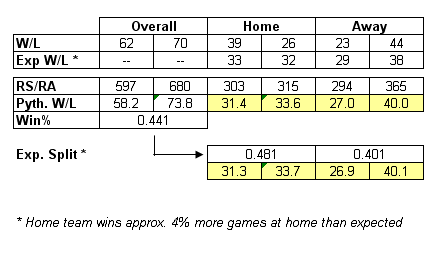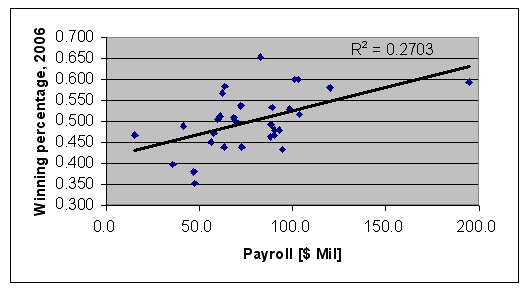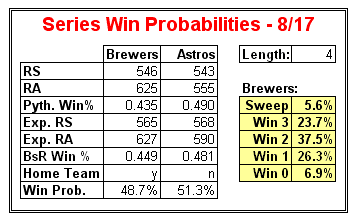With about a quarter of the season remaining, the NL Wildcard race is completely up in the air:

When you see that the Brewers are only 4 games back, it's hard not to get excited but what are their real chances? The part of the equation that is often ignored by playoff hopeful fans is just how many teams are actually in the running. In this case, an astounding 10 NL teams could still claim to be in the wildcard race at this time. How do we sort the Brewers wild card chances out of that mess?
Baseball Prospectus calculates playoff odds by running a monte carlo simulation for the remainder of the season and finding the probability of each team winning their division or the wild card. They calculate the "true skill" of each team by looking at their raw stats to determine how many runs they "should" have scored and given up so far. From that, they can simulate all the remaining games of the season. How do the Brewers fair?
BP's Playoff Odds ReportNot so good. The Brewers have been heavily outscored this year and their raw stats indicate that that was no fluke. They give the Crew a 2.7% at winning the NL Central and a 1.9% chance at winning the wild card. That's a 4.6% chance to make the post season.
Not so good.
But wait. Those raw stats were compiled in part by players not even on the team anymore. Furthermore, players like Sheets, Ohka and Cordero have hardly even played for the Brewers this year. The major flaw of this approach is that it might tell you how a team has done so far but it isn't adjusted for injuries and trades. For a team like the Crew, this can substantially distort the team's true skill level. Perhaps we can take another approach.
What I'm going to do it run a poor man's monte carlo. I'll simply choose a reasonable skill level for each team and estimate what the resulting average record each team would finish with. If I think a team has a .500 winning % skill level, they'll have a 50% of winning each of the remainder of their games. No home/road considerations. No strength of schedule. No wildcard team playing wildcard team. Like I said, poor man's monte carlo.
The next assumption I'll make is that all the teams in the wildcard race (except the Brewers) are perfectly mediocre (.500 winning %). When you look at it, that's really not a huge assumption to make. No wild card hopeful team has outscored their opponents by much if at all. BP doesn't have any of those teams finishing with more than an average of 82 wins! I think this “mediocre” assumption models reality pretty well.
This is where we diverge from reality, however. The only team that has been outscored significantly is our very own Milwaukee Brewers. But since I'm doing the simulation, let's see how the Brewers would do if their true skill level is higher. I'll adjust their "true" winning % skill level and see how often that results in the Brewers being at least tied for the wildcard crown at the end of the season.
I ran each season 10,000 times. That should be enough to at least get in the correct ball park. I also listed the number of wins that winning % would give a team over a 162 game season, just to put the winning % in perspective:
-SKILL-- WC
.500 81 5.0%
.525 85 9.2%
.550 89 14.6%
.575 93 21.9%
.600 97 29.9%
According to my approach, if the Brewers have a .500 skill level the rest of the way, they have a one in 20 shot of winning the wildcard. That's really not too bad, all things considered. While the offense probably isn't very good, I think the Brewers pitching staff and defense are pretty decent right now. If we really want to be optimistic and call this a .525 skill level team, their WC chances go up to 9.2%. Couple that with the Crew’s small chance at the NL Central and they have a reasonable outside shot at the post season. Hey, I’m a Brewer fan. Even a 10% chance is a lot!
What's important to note is that even if we pretend the Brewers are a 97 win season type team right now, they would still only have about a 30% chance of winning the wildcard. There are simply too many teams currently in the running to give the Brewers anymore than around a 10% or 15% chance right now. I'll still be watching those wild card standings but it's going to be an up hill battle, to say the least.





